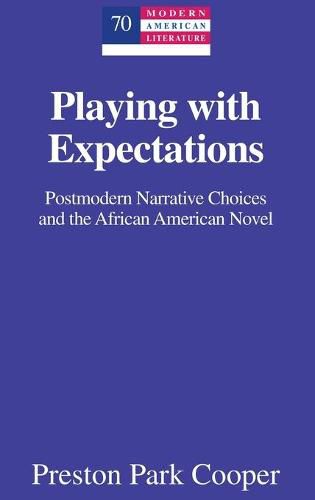Readings Newsletter
Become a Readings Member to make your shopping experience even easier.
Sign in or sign up for free!
You’re not far away from qualifying for FREE standard shipping within Australia
You’ve qualified for FREE standard shipping within Australia
The cart is loading…






This title is printed to order. This book may have been self-published. If so, we cannot guarantee the quality of the content. In the main most books will have gone through the editing process however some may not. We therefore suggest that you be aware of this before ordering this book. If in doubt check either the author or publisher’s details as we are unable to accept any returns unless they are faulty. Please contact us if you have any questions.
Playing with Expectations: Postmodern Narrative Choices and the African American Novel explores a merging of works by African American novelists to promote critical acceptance of postmodern literature and advance the legitimacy and usefulness of postmodern literary techniques. This book examines novels by Ishmael Reed, Charles Johnson, and Toni Morrison, and two novels by comparative newcomer Colson Whitehead - all of whom have used postmodern techniques not only to help their work be read, but to gain a racially wide audience that is open, willing, and able to understand.
Jean-Francois Lyotard’s concept of local narratives and grand narratives helps show how African American novels, using postmodern strategies, function as small-scale narratives. Consequently, these narratives, set up in opposition to hegemonic metanarratives, offer readers an alternative mode of thinking to that offered by the larger, more widely diffused and self-distributing grand narratives. By providing realistic characters in ways that defy the typical grand narratives of race, as well as the expectations of storytelling itself, readers are stimulated into new realizations about previously accepted ideas, and become prepared to spread the now-realized truth about the inaccuracies of the racist grand narratives.
This book is a vital and thought-provoking addition to the ongoing conversation about storytelling and race, and will engage readers in classroom discussions dealing with race, postmodernism, or twentieth-century literature in a more general sense.
$9.00 standard shipping within Australia
FREE standard shipping within Australia for orders over $100.00
Express & International shipping calculated at checkout
Stock availability can be subject to change without notice. We recommend calling the shop or contacting our online team to check availability of low stock items. Please see our Shopping Online page for more details.
This title is printed to order. This book may have been self-published. If so, we cannot guarantee the quality of the content. In the main most books will have gone through the editing process however some may not. We therefore suggest that you be aware of this before ordering this book. If in doubt check either the author or publisher’s details as we are unable to accept any returns unless they are faulty. Please contact us if you have any questions.
Playing with Expectations: Postmodern Narrative Choices and the African American Novel explores a merging of works by African American novelists to promote critical acceptance of postmodern literature and advance the legitimacy and usefulness of postmodern literary techniques. This book examines novels by Ishmael Reed, Charles Johnson, and Toni Morrison, and two novels by comparative newcomer Colson Whitehead - all of whom have used postmodern techniques not only to help their work be read, but to gain a racially wide audience that is open, willing, and able to understand.
Jean-Francois Lyotard’s concept of local narratives and grand narratives helps show how African American novels, using postmodern strategies, function as small-scale narratives. Consequently, these narratives, set up in opposition to hegemonic metanarratives, offer readers an alternative mode of thinking to that offered by the larger, more widely diffused and self-distributing grand narratives. By providing realistic characters in ways that defy the typical grand narratives of race, as well as the expectations of storytelling itself, readers are stimulated into new realizations about previously accepted ideas, and become prepared to spread the now-realized truth about the inaccuracies of the racist grand narratives.
This book is a vital and thought-provoking addition to the ongoing conversation about storytelling and race, and will engage readers in classroom discussions dealing with race, postmodernism, or twentieth-century literature in a more general sense.